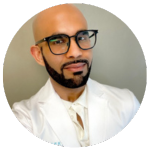This is not as easy as it sounds. When I started in dermatology I thought I was going to be a dermatopathologist. Figuring out your niche requires you to evaluate and ask yourself these questions:
- Where do I want to live and settle after training?
- Do I want to work in academics or in private practice?
- Is the area I want to be in need of a specific service (contact dermatitis vs peds derm vs complex medical derm)
- Do I need a fellowship to be successful?
- Am I interested in seeing everything or focusing on 1-5 things (hair loss, psoriasis, HS,etc)?
- Do I want to be involved in research?
- How much does quality of life matter to me?
It is not unreasonable to think of these questions and revisit them every year you are in training. The dermatology climate changes every year but there are some constants: pediatric dermatology is in high demand, dermatopathology is NOT in high demand but there is a deficiency of dermatology trained dermatopathologists, general medical dermatology is in demand, cosmetics is NOT in demand but is sought after by many, Mohs surgery is saturated but only in major cities with most jobs being in more rural areas. Knowing these basic relative constants can help you navigate your career.
I started residency and fell in love with clinical dermatology and lasers. I could no longer see myself spending part time in an officer reading slides. I knew after training I wanted to live in a major city and for this knowing the job market was essential. There were minimal dermatopathology jobs in major cities. I was torn between academic and private practice after training so I decided to do both. Currently I work in private practice and 1-4 days a month working in an academic center. Another thing to consider is unexpected circumstances and job security. During COVID, hospitals were able to keep their faculty on staff and found ways to keep them on a payroll. I know many private practices that suffered and many providers had no income for 3+ months. Some of them had to sell to private equity to stay afloat. In essence, hospital jobs are more secure and provide you the best benefits package. However, there are other hurdles such as administrative burden, institutional policies and regulations, and things in general take more time.
In my residency program we did a lot of pediatric dermatology and I was lucky to have the best exposure. I gained an interest in pediatric dermatology because of program director and one of my other attendings (Karen Wiss MD, and Leah Belazarian MD). I started to tell people about my rising interest and >80% of people told me pediatric dermatology is a waste of time and money. People said “there is no money in pediatric dermatology.” I was very frustrated and taken aback by this. I spoke to my attendings who assured me that while pediatric dermatology is not as procedural it is very rewarding and there is a huge need. I figured if there was a demand there would always be a job (and a guaranteed job guarantees an income). Unlike cosmetics, there is no fluctuation with the economy, etc. I also wanted to make sure I was going to be in demand. Once I started my pediatric dermatology fellowship I was hounded by recruiters and I was able to call the shots. There is something to be said about being in need.
I am pro-fellowship. I think as we move into a healthcare system with lots of delegation and advanced practice providers, there is a need for expert care. There are many fellowships in dermatology (some that are accredited and some that are not). Fellowships include: complex medical dermatology, rheum-derm, pediatric dermatology, Mohs surgery, CTCL, contact dermatitis, cosmetic surgery, skin of color, etc. Doing a fellowship makes you an expert. It opens up doors to being a key opinion leader, podium speaker, referral expert, and also gives you negotiation power. To set up a niche you have to dedicate time to your niche. Most experts have 1-2 clinic days that are dedicated to their area of interest. For example, I am a pediatric and cosmetic dermatologist and those are my two niches. I do two days of dedicated pediatric dermatology and 2 days of cosmetic surgery. Once you establish your niche you need to spread the word. This is the best time to reach out to practices within a 25 mile radius, meet with providers, have dinners/lunches, and offer your knowledge. Your niche is only as good as your patient following.
If you are in private practice it is easier to establish a niche because you are your own person and have full reign over what you want to do; however, getting involved in research is more difficult. If industry is not seeking you out, you might have to do investigator-initiated studies which require a lot of work on your end. In academics, it is a essential and often recommended to have a niche as the patient volume for general dermatology is very high. Being in an academic center, you can establish yourself as an expert which helps attract funding and industry input. In private practice doing research is more complicated as you have to get a private IRB, create a research center, hire staff that are trained to maintain records, follow protocols, and link with industry. In an academic center, setting up research is slightly easier because of the available IRB, research staff, and large patient base for recruitment.
Author
-

Originally from New York City,he graduated summa cum laude from the New York Institute of Technology, where he completed a seven-year accelerated combined medical program.He completed his dermatology residency at the University of Massachusetts where he also completed his pediatric dermatology fellowship, where he gained an interest in vascular lesions, pediatric laser, and dermatologic surgery of pediatric patients. Dr. Lal specializes in pediatric and adult dermatology, laser surgery, soft tissue filler augmentation, body sculpting, pigmentary abnormalities of the skin and enjoys treating patients from birth onwards.
View all posts





